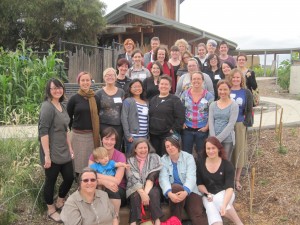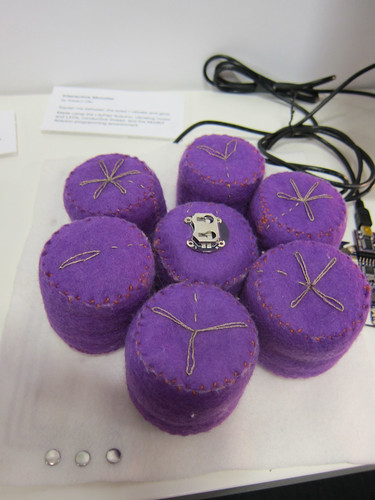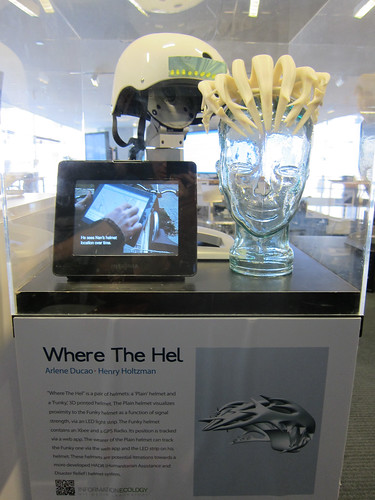Support a geek feminist nonprofit!
I’m donating — at the $15/month level — to support The Ada Initiative, a small non-profit that’s tackling sexism in open tech and open culture. Over the last few years we’ve seen women stand up to assert that sexism and gender bias exists. It affects us directly and indirectly. It harms our lives. It makes it harder for us to contribute to projects that further our ideals. We believe passionately, some of us, in FOSS, in collaboration and sharing, building tools that empower people, opening information access for all to use and build upon. We want to participate fully in that culture.
One of the first steps to increase women’s participation is naming the problems of bias, misogyny, sexism, and harassment. That’s absolutely crucial! We continue to do that, in parallel with many other efforts. To many people, calling out problems looks like complaining. Why are we just whining about sexism? Why don’t we “do something”? The Ada Initiative is an earnest — and effective — way of doing something. If you’ve ever felt impatient with people’s complaints about sexism, here’s an opportunity for you to put your money on the line, to support a force for positive change.
How can we change things? What about constructive actions? What positive steps can we take? The Ada Initiative takes on the task of improving women’s participation in FOSS conferences and events, and in other public arenas for speech. Valeria Aurora and Mary Gardiner, and the rest of us, are working to build spaces for women to participate in public discourse.
Harassment often keeps women out of that public sphere, or drives them away. The Ada Initiative is working with a large number of tech conferences and other events to take a definite stand against harassment. But we also work to strengthen women’s participation in other ways. Here are some of the other things The Ada Initiave does:
Created AdaCamp conference: Held two AdaCamps, a wildly popular unconference for women and advocates of women in open tech/culture.
Made conferences safer for women: Wrote and encouraged adoption of policies preventing harassment of women, now in use by hundreds of conferences and organizations in open tech/culture as well as science fiction conventions, fan conventions, computer game conferences, and skeptic/atheist conferences.
Reached thousands of people through speaking: Spoke about increasing diversity and welcoming women at several conferences, including co-founder Mary Gardiner’s keynote at Wikimania 2012. We also helped many of our advisors and supporters develop keynote speeches on diversity, including Sumana Harihareswara’s OSBridge 2012 keynote, Sarah Stierch’s Wikimedia Academy 2012 keynote, Alex “Skud” Bayley’s GUADEC 2012 keynote, and Michael Schwern’s YAPC 2012 keynote.
Created a non-profit charity: Created a charitable non-profit organization from scratch, including acquiring tax-exempt status in the United States, a non-trivial task.
Advised organizations on supporting women: Provided free consulting to several organizations on high-profile incidents of sexism, improving recruitment and retention of women in open tech/culture jobs, and creating a friendlier environment for women.
Taught hands-on workshops: Wrote and taught four free workshops teaching practical skills to men wanting to help women and trans people in open/tech culture.
Conducted surveys and research: We ran several surveys, including a survey of over 2800 people about attitudes towards women in open tech/culture.
Future work by The Ada Initiative will include more workshops for women, on contributing to open source projects, on fighting imposter syndrome, and on designing and running good gender diversity programs, as well as their usual work with conferences.
Here’s another thing I absolutely LOVE about The Ada Initiative. It’s about adult women in this field. I love that it’s not dismissing those of us who are already here, who are already participating. Support us who are going to conferences and speaking at events, submitting patches and writing the code! Helping us, helping us not burn out or quit in disgust because the bad things never change. Rather than writing off the women already HERE, and trying to recruit a new crop of fresh faced teenagers and recent graduates, The Ada Initiative is fighting to patch the “leaky pipeline”‘s leaks.
Women’s work fighting sexism is important. It’s especially important when it’s about supporting other women, pulling together for constructive action. I’m a supporting donor to The Ada Initiative because I want Val and Mary to get paid for doing that work, because they’re GREAT at it.
Feminism and tech/Internet activism are a big part of my life. I’ve been part of LinuxChix, Systers, DevChix, phpWomen, Drupalchix, and am peripherally involved in so many other efforts by women in specific F/LOSS communities to organize and support each other. They’re all doing great work in many dimensions. Of course, I work at BlogHer, which supports women’s participation in public discourse in blogging and social media. And I’m proud to be part of Geek Feminism the blog and wiki, which has developed into a highly organized and effective group, doing consistent work. The Ada Initiative has ties to many of these communities, and intersects with them. As a feminist FOSS non profit it can give help coordinated across many projects and communities. We have the chance to make a lasting institution for our support.
Please join The Ada Initiative, and donate anything you can afford — but I’m hoping here that you all will join at the $15/month or $30/month level! This, along with my monthly donation to Noisebridge will be my main donation effort for 2012 and 2013. I hope you join me! (And the fabulous rockstars who are TAI’s Directors and Advisors!) Donate, and … I’ll see you at AdaCamp 2013!





